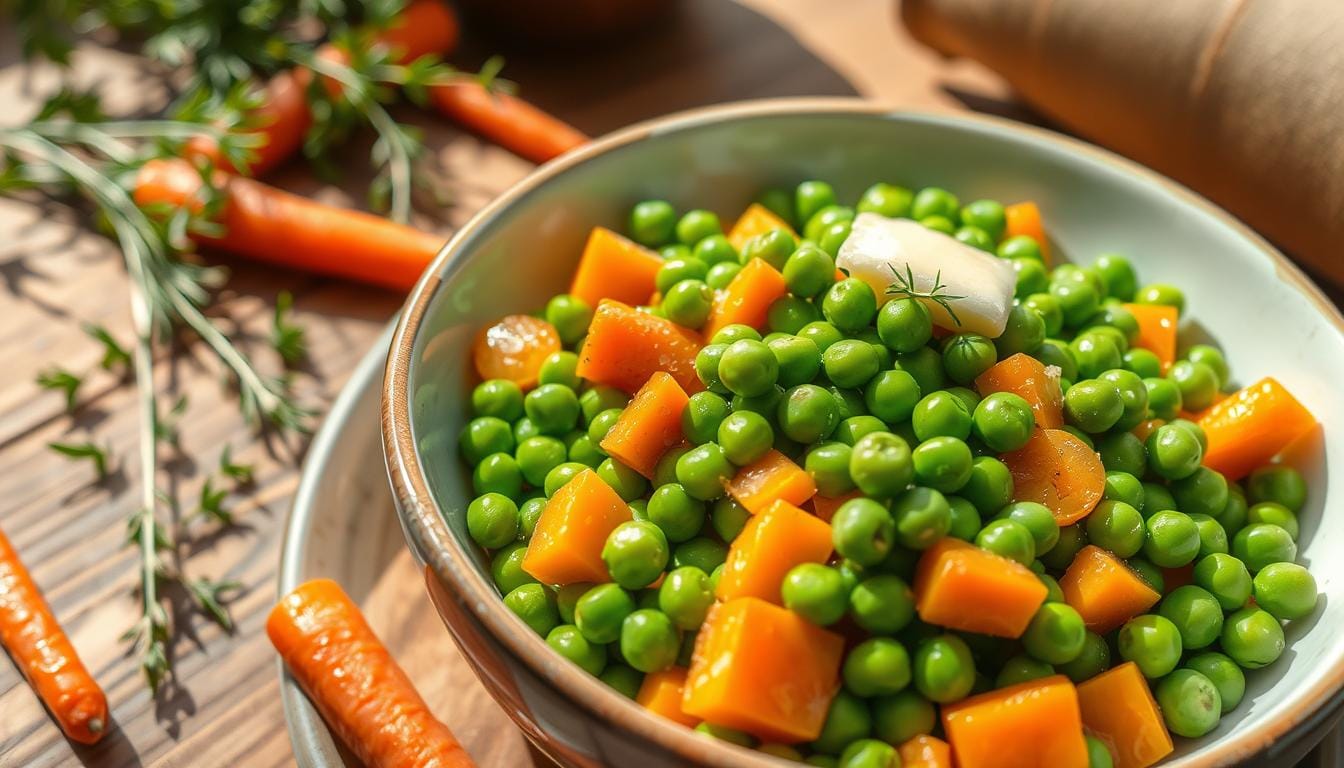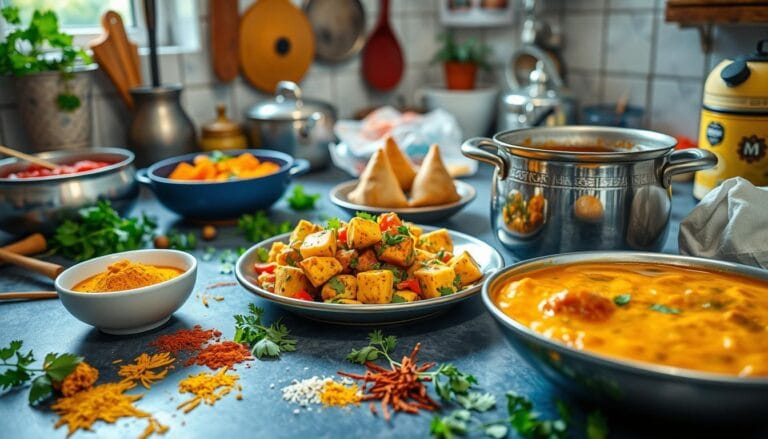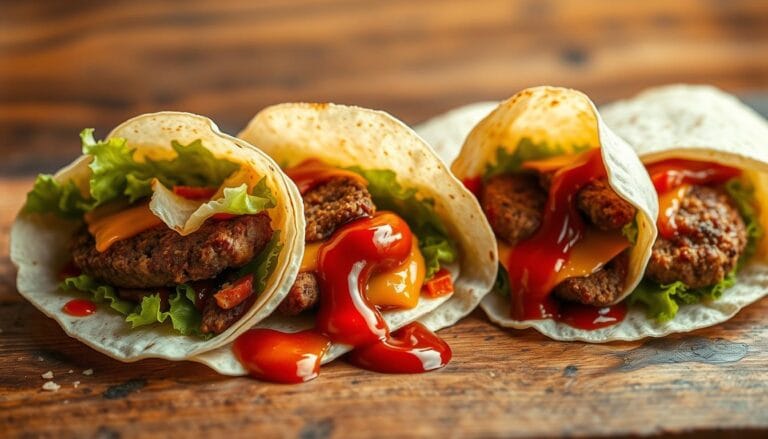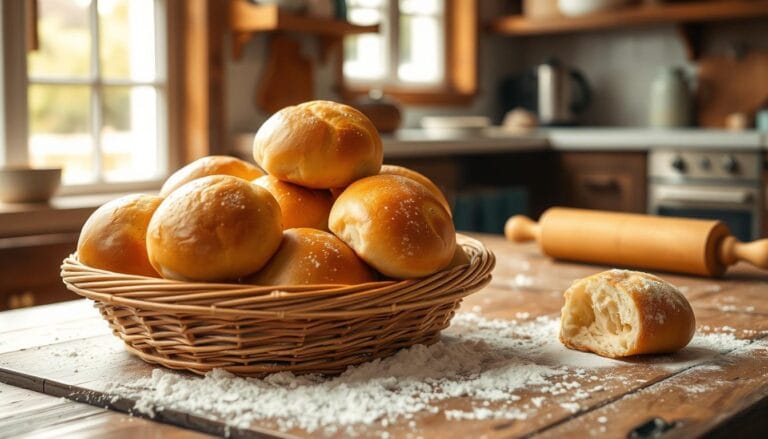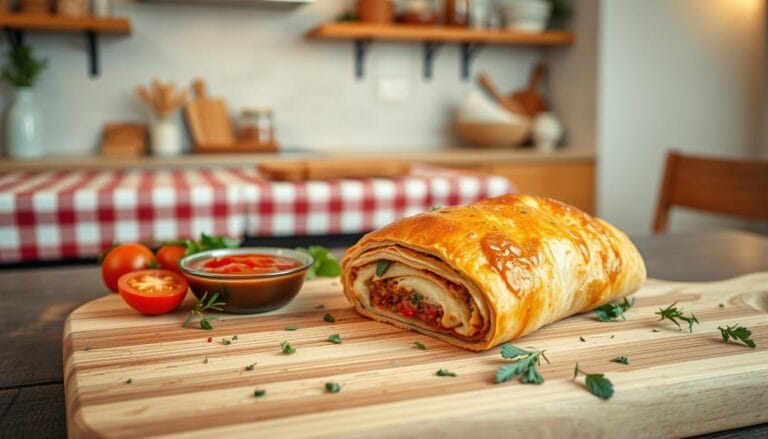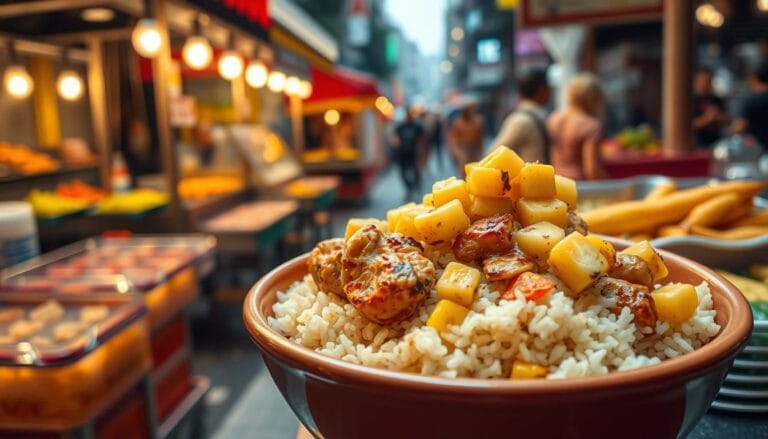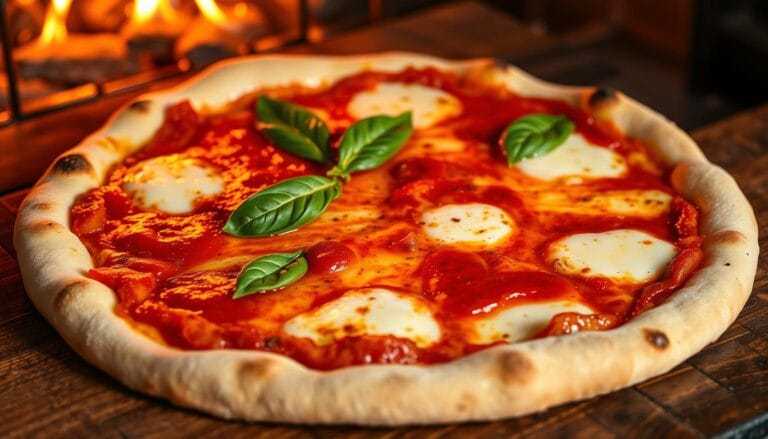How to Cook Peas and Carrots: Quick and Easy Recipes
Peas and carrots are a classic combo in cooking. They can be steamed, roasted, or sautéed. Their taste and health benefits make them a favorite in many homes. You can use fresh or frozen peas and carrots to make many tasty dishes.
Cooking peas and carrots can spice up your meals. They’re quick to prepare, making a dish ready in minutes. For example, a recipe for 4 people takes just 15 minutes. It has 167 kcal per serving, perfect for a healthy meal.
Table of Contents
Essential Guide to Selecting Peas and Carrots
Choosing the right ingredients is key for tasty frozen carrot recipes or a simple peas and carrot dish. Fresh carrots should be firm and without blemishes. Peas should be plump and tender. It’s important to pick the right type of carrots and peas for your recipe.
For a hearty stew, choose larger, more robust carrots. For a quick salad, go for smaller, sweeter carrots. Peas come in various types, like snow peas, sugar snaps, and garden peas.
Frozen peas and carrots are also great options. They’re as nutritious and tasty as fresh ones, and easier to use in recipes. When picking frozen peas and carrots, look for “flash frozen” labels to ensure they’re at their best.
| Type of Carrot | Description |
|---|---|
| Nantes | Sweet and slender, great for salads |
| Imperator | Large and robust, ideal for stews |
| Little Finger | Small and sweet, perfect for snacking |
By following these tips, you can make delicious and healthy meals with frozen carrot recipes or a simple peas and carrot recipe.
Nutritional Benefits of This Classic Vegetable Duo
Peas and carrots are packed with nutrients. They are nutrient-rich and offer health benefits. They are high in fiber, vitamins, and minerals but low in calories.
Experts say we should eat 5 servings of fruits and veggies daily. One serving is a medium fruit or veggie. Peas and carrots help meet this goal, with 1/2 cup being one serving.
They are full of vitamin A, vitamin K, and potassium. These nutrients help with digestion, boost the immune system, and lower disease risk.
- High in fiber, which can help regulate blood sugar levels and promote digestive health
- Rich in vitamins and minerals, including vitamin A, vitamin K, and potassium
- Low in calories, making them an excellent addition to a weight management diet
- Supports healthy immune function, reducing the risk of illness and infection
Adding peas and carrots to your diet can greatly improve your health. They are full of nutrients and low in calories. They are a great choice for a balanced diet.
Preparation Methods for Fresh Peas and Carrots
Working with fresh peas and carrots requires the right preparation to enhance their flavors and textures. Whether using frozen or fresh, the key to a great recipe is in how you prepare them. Start by cleaning and peeling your carrots to remove dirt or debris.
Then, cut your carrots into the shape and size you prefer. You can slice, dice, or julienne them. For peas, rinse them with cold water and remove any stems or leaves. If using frozen peas, you can skip this step and cook them directly.
Cleaning and Peeling Techniques
Cleaning and peeling carrots are essential steps. Use a vegetable brush to scrub away dirt, then peel them with a peeler. You can also use frozen peas and carrots to save time.
Proper Cutting Methods
After cleaning and peeling, cut your carrots into the desired shape. Try slicing, dicing, or julienning them. For a tasty recipe, cut carrots into bite-sized pieces and sauté them with oil and garlic.
Pre-cooking Tips
Pre-cooking peas and carrots helps keep their nutrients and texture. Try blanching or steaming them for a few minutes. For a simple recipe, sauté frozen peas and carrots with oil and garlic as a side dish.
By following these preparation tips, you can make a delicious and healthy peas and carrot dish. Whether using fresh or frozen, the secret to a great dish is in the preparation and cooking techniques.
| Vegetable | Nutritional Value | Preparation Method |
|---|---|---|
| Carrots | High in beta-carotene, fiber, potassium, and vitamin K | Steaming, roasting, or sautéing |
| Peas | Good source of multivitamins and anti-oxidants | Steaming, boiling, or sautéing |
Mastering Basic Cooking Techniques
To cook tasty and healthy meals with peas and carrots, you need to learn basic cooking skills. These include sautéing, roasting, and steaming. These methods help you make various dishes that highlight the natural taste of peas and carrots.
Blanching is a good way to keep peas and carrots colorful and full of nutrients. This quick method involves boiling them for a few minutes. For instance, peas need 1-2 minutes, and carrots take 3-5 minutes.
Here are some basic cooking techniques to get you started:
- Sautéing: quickly cooking peas and carrots in a pan with a small amount of oil
- Roasting: cooking peas and carrots in the oven with some olive oil and seasoning
- Steaming: cooking peas and carrots using steam to preserve their nutrients
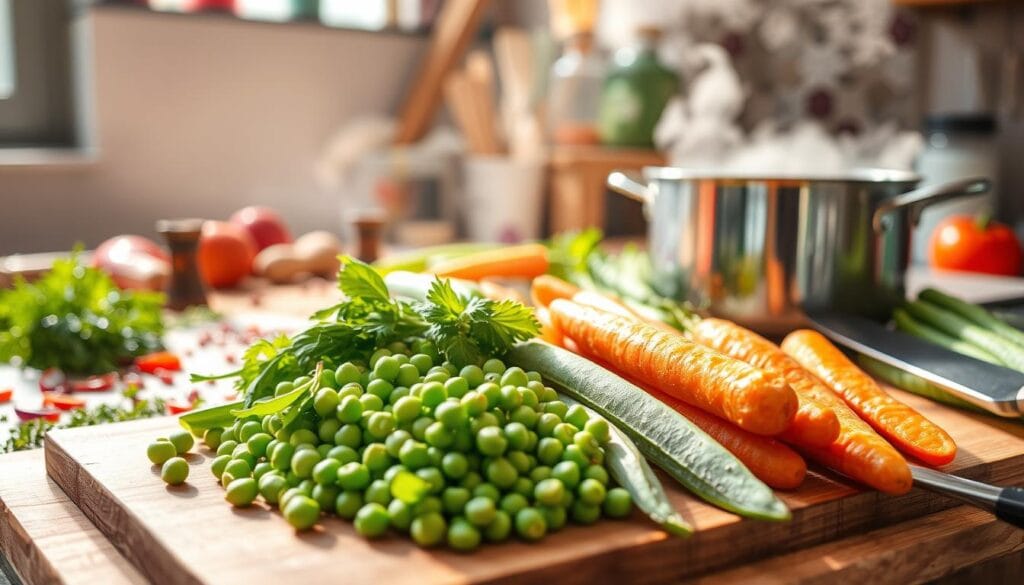
By mastering these basic cooking techniques, you can make a variety of tasty and healthy dishes with peas and carrots. Whether you’re sautéing, roasting, or steaming, these methods will enhance the flavors and textures of these versatile vegetables.
Cooking is all about experimentation and having fun with different ingredients and techniques. Don’t be afraid to try new things and make mistakes – it’s all part of the learning process!
Always use fresh and high-quality ingredients, including peas and carrots, for the best results. With practice and patience, you’ll become a pro at basic cooking techniques and make delicious meals with ease.
Delicious Ways to Season Peas and Carrots
Seasoning peas and carrots offers endless possibilities. You can use traditional herbs, international spices, or simple butter and garlic. Adding frozen carrot recipes to your meals can make them more flavorful and nutritious.
Try thyme and rosemary for a classic taste. These herbs complement peas and carrots well. Or, explore international flavors like curry and cumin. These spices can transform your dish into something unique and delicious.
Butter and Garlic Options
Butter and garlic can make your peas and carrots taste richer. This combo is easy to prepare and suits many dishes. Simply melt butter, add garlic, and sauté your vegetables until tender. Adding frozen carrot recipes can enhance both taste and nutrition.
Other seasoning ideas include:
- Adding fresh lemon juice for a citrusy twist
- Using olive oil for a healthier alternative
- Adding fresh herbs like parsley or dill for extra flavor
Experimenting with different seasonings can lead to a tasty peas and carrot dish. Whether it’s a simple side or a main course, there’s a way to make it delicious.
Quick Methods for Cooking Frozen Peas and Carrots
Cooking frozen peas and carrots is quick and easy. You can use the microwave, steamer, or air fryer. The air fryer is the fastest, cooking them in just 10 minutes. Just preheat it to 400 degrees, add the peas and carrots, and cook for 10 minutes.
Steaming is another fast method that keeps nutrients in. Place the peas and carrots in a steamer basket over boiling water. Add a bit of water and steam for 4-6 minutes. You can also add salt, pepper, and garlic powder for extra flavor.
Here is a summary of the nutritional content of frozen peas and carrots per serving:
| Nutrient | Amount |
|---|---|
| Calories | 62 kcal |
| Carbohydrates | 13 g |
| Protein | 4 g |
| Fat | 1 g |
Cooking frozen peas and carrots is a healthy way to add veggies to your meal. These quick methods make it easy to have a tasty and nutritious side dish in no time.
Advanced Cooking Techniques and Recipes
There are many ways to make peas and carrots taste better and be healthier. Roasting is one method that makes them sweeter. Just toss them with olive oil, salt, and pepper, then roast at 425°F (220°C) for 20-25 minutes. They should be tender and lightly browned.
Sautéing is another technique that cooks frozen peas & carrots fast. Heat oil in a pan over medium-high, add the peas & carrots, and cook for 5-7 minutes. You can add garlic, ginger, or other seasonings for extra flavor. Try sautéing them with butter, salt, and pepper for a tasty side dish.
Steaming is also good for keeping the nutrients in peas and carrots. Place them in a steamer basket over boiling water, cover, and steam for 5-7 minutes. Adding lemon juice or herbs to the water can make it even better.
Storage Tips and Shelf Life
Proper storage is key to keeping peas and carrots fresh. Raw, unpeeled carrots can last 3 to 4 weeks in the fridge. Peeled or cut carrots last 2 to 3 weeks. Cooked carrots stay good for up to 5 days.
To keep frozen peas and carrots fresh, use airtight containers. Carrots can last 6 months in a root cellar. Carrots in water stay fresh for up to 3 weeks with weekly water changes.
Refrigeration Guidelines
Fruits and veggies, like peas and carrots, are best at 32-40℉ in the fridge. Some need slightly warmer temperatures. Leafy greens and herbs need more humidity, while most fruits prefer less.
Freezing Methods
Freezing peas and carrots requires blanching first. Then, store them in airtight containers or bags. They can last up to 8 months. Keep ethylene producers away from ethylene-sensitive items to prevent moisture loss.
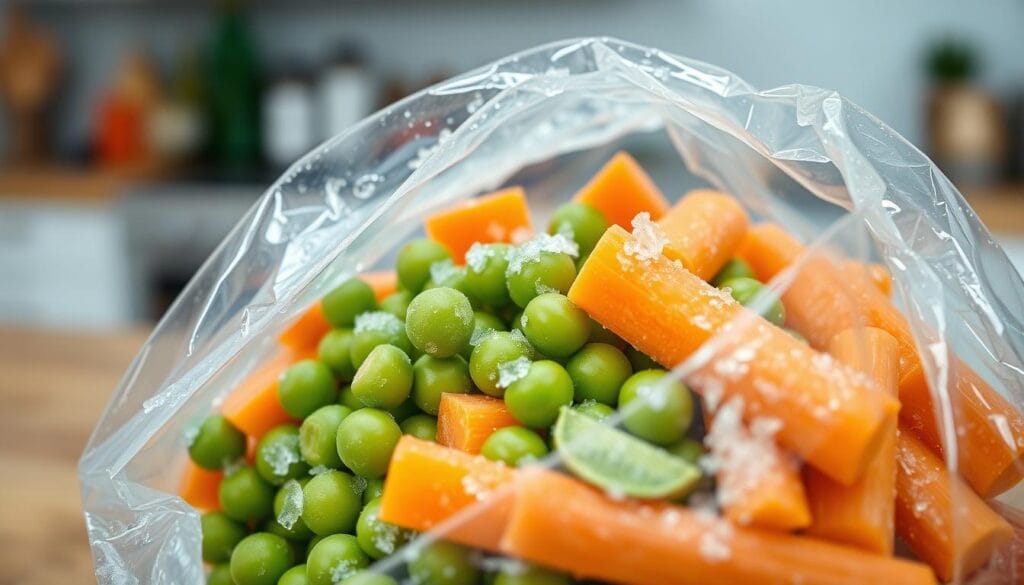
By following these tips, you can enjoy peas and carrots longer. Always check their freshness and store them right to avoid waste.
| Produce | Storage Method | Shelf Life |
|---|---|---|
| Raw Carrots | Refrigerator | 3-4 weeks |
| Peeled Carrots | Refrigerator | 2-3 weeks |
| Cooked Carrots | Refrigerator | 5 days |
| Frozen Peas and Carrots | Freezer | 8 months |
Common Cooking Mistakes to Avoid
When cooking peas and carrot recipe, it’s key to steer clear of common mistakes. Overcooking can make your dish lose texture, sweetness, and color. To prevent this, follow the cooking instructions for frozen peas & carrots.
Don’t boil your veggies, as it leads to a big loss of vitamin C. Choose dry heat methods like sautéing or roasting to boost flavors. Here are some helpful tips:
- Cook frozen peas & carrots straight from the freezer to avoid a mushy texture.
- Steer clear of boiling or steaming, and use dry heat instead.
- Add simple seasonings like salt, pepper, and herbs to greatly improve taste.
Using the right cooking methods can greatly improve your peas and carrot recipe. By avoiding common mistakes and following these tips, you can make a tasty and healthy dish.
| Cooking Method | Benefits | Drawbacks |
|---|---|---|
| Sautéing | Enhances flavors, retains nutrients | Can be high in calories if oil is used |
| Roasting | Brings out natural sweetness, easy to prepare | Can be time-consuming, requires attention |
| Steaming | Retains nutrients, low in calories | Can be boring, lacks flavor |
Conclusion: Perfecting Your Peas and Carrots
Perfecting your peas and carrots is a journey of trying new things and making small changes. It’s about picking the freshest ingredients and learning different cooking methods. The most important thing is to be patient and open to new ideas.
There are many ways to cook peas and carrots. You can roast carrots for a sweet flavor or sauté frozen peas and carrots for a fast side dish. Don’t forget to add herbs, spices, and other tasty ingredients to make it your own.
With the tips from this article, you’ll get better at making peas and carrots that are both healthy and tasty. Let your creativity run wild with this classic combo. Enjoy your delicious meals!
FAQ
What are the different types of carrots and peas available?
What are the benefits of buying frozen peas and carrots?
What are the nutritional benefits of peas and carrots?
How do I prepare fresh peas and carrots?
What are the basic cooking techniques for peas and carrots?
How can I season peas and carrots?
How do I cook frozen peas and carrots?
What are some advanced cooking techniques for peas and carrots?
How do I properly store peas and carrots?
What are some common cooking mistakes to avoid with peas and carrots?
Have You Tried Our Recipe Yet?
i tried this recipe and i like it
Absolutely delicious! 🍽️🔥 I tried your recipe, and it turned out amazing! The instructions were clear, and the flavors were perfectly balanced. Thank you for sharing such a fantastic dish—definitely adding this to my favorites! Can’t wait to see more recipes from you! 👏😍

